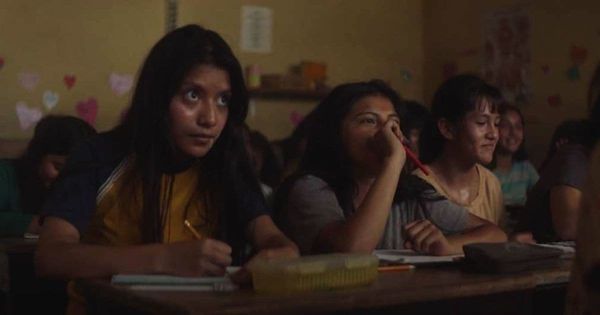Eye For Film >> Movies >> Saria (2019) Film Review
Saria
Reviewed by: Jennie Kermode

On the 8th of March, 2017, events at the orphanage of the Virgen de La Asunción in the small town of San José Pinula, Guatemala, made headlines around the world. It wasn't the accusations of rape that did it - after all, worldwide, 37% of children sent to orphanages suffer some kind of sexual abuse. Rather, it was what happened afterwards when the girls who lived there tried to take control of their own fate.
Accounts of the incident differ. In this Oscar-nominated dramatisation, writer/director Bryan Buckley builds up his story by blending what can be taken from them with reasonable supposition and a degree of artistic license. The film centres on a fictional girl, Saria (Estefanía Tellez) and her sister Ximena (Gabriela Ramírez), who share a bed in the overcrowded institution and share a dream of getting out. Saria has identified a spot where they might jump from the walls into a nearby tree and scramble down safely to the ground. The tricky part will be getting away with it. At first she is thinking about sneaking out, but when Ximena talks to the boy she has fallen for, he makes a more radical suggestion.

With the residents of another orphanage forming the cast and acquitting themselves impressively, this is a film with a big emotional impact which doesn't depend too heavily on viewer familiarity with its origins. There are some nice little directorial flourishes, particularly in scenes involving a spider which show us something of Saria's character and also put into perspective the way those in charge of the orphanage see the girls. Overall it's a little too reliant on shock, even though these are events that should shock us - it would be nice to learn more about who the girls are as personalities, distinct from what they are going through. There's also an undeveloped thread concerning Saria's dream of making it to the US border and somehow finding a way across which suggests that Buckley is trying to make a political point without properly integrating it into the narrative. It underlines the girl's naivety but - like a brief reference to Mayan identity - hints at a wider context that is thereafter ignored.
Despite its flaws, this is a strong piece of filmmaking drawing much-needed attention to a story that the world has been quick to forget. Buckley handles the issues around abuse with sensitivity and his depiction of institutional life is disturbing enough even before they come into frame. His trust in his leads is well placed and the result is a moving tribute to the Virgen de La Asunción victims.
Reviewed on: 31 Jan 2020















